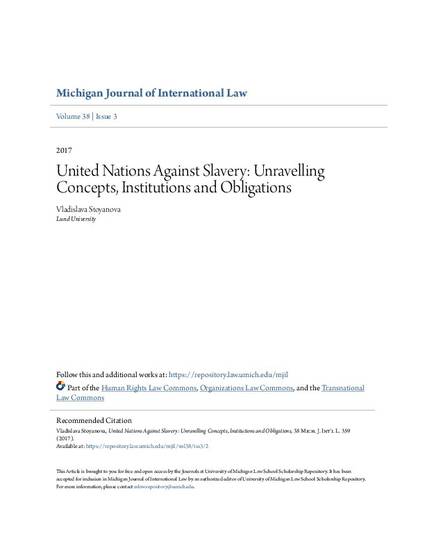
Article
United Nations against Slavery: Unravelling Concepts, Instiutions and Obligations
Michigan Journal of International Law
(2017)
Abstract
2016 marks ninety years since the adoption of the Slavery Convention, the first multilateral treaty which provides a definition of slavery in international law and which obliges its State Parties to bring about the abolition of slavery. The latter obligation was not immediate since abolition had to be achieved only ‘progressively and as soon possible’. This qualifier testified to the overall ambivalent position of states towards abolition at that time. 2016 also marks fifty years since the adoption of the International Covenant on Civil and Political Rights (ICCPR or the Covenant). With its comprehensive territorial scope amounting to a total of 168 State Parties, the ICCPR is ‘the pre-eminent UN human rights instrument setting standards for the world at large.’ The Covenant with its Article 8 entrenched the unqualified right not to be held in slavery or servitude and not to be required to perform forced or compulsory labour. With the adoption of the Covenant in 1966, international law for the first time conferred such an individual legal entitlement. This entitlement has been widely perceived as the core of human rights law. The struggle against slavery and the slave trade in the late eighteenth century is thus usually referred to as one of the most important antecedents of international human rights law. The ‘fight’ against slavery is also widely referred to as one of the first human rights campaigns.
What has international human rights law achieved in terms of addressing slavery ninety years after the adoption of the Slavery Convention and fifty years after the adoption of the ICCPR? A clarification as to my focus is immediately due, in case of charges down the line that I have missed some points that arise out of this difficult question. In particular, achievements will be measured in two respects. First, how have the rights enshrined in Article 8 of the ICCPR been interpreted and how has their meaning been developed so that they can be applied in light of the contemporary circumstances? The second benchmark for measuring achievements relates to the institutional mechanisms established at the UN level for monitoring whether and how states ensure the right not to be held in slavery, servitude or forced labour. It is important to assess these two aspects, i.e. the development of the international human rights law norms concerning slavery and the role of institutions for ensuring compliance, not only because of the above mentioned anniversaries which, indeed, prompt us to reflect upon the accomplishments in this area of international law. At least as importantly, it merits emphasis that there has been a scarcity of scholarly engagement with Article 8 of the ICCPR and with the question how this provision provides a basis for holding states internationally responsible for their failures to ensure the rights enshrined therein. The examination of slavery, servitude and forced labour within the international law paradigm of state responsibility has remained a blind spot. This gap has led to inadequate understanding of the significance of the right not to be held in slavery, servitude and forced labour in terms of required interventions. On a related point, it is not likely that states enslave or keep individuals in slavery thus directly incurring international responsibility. Rather, states might incur international responsibility for their failure to ensure the rights protected by Article 8 of the ICCPR. There has been no reflections on the affirmative obligations imposed by this provision, which is a significant gap because from the contemporary perspective, it is rather private actors who subject individuals to abuses intended to be captured by the scope of Article 8 of the Covenant. The issue thus is what affirmative measures states are obliged to undertake to address these situations. Similarly, no judicial examination of the limits of these positive obligations has been undertaken.
Keywords
- slavery,
- servitude,
- forced labour,
- Article 8 of the ICCPR,
- positive obligations
Disciplines
Publication Date
2017
Citation Information
Vladislava Stoyanova. "United Nations against Slavery: Unravelling Concepts, Instiutions and Obligations" Michigan Journal of International Law Vol. 38 Iss. 3 (2017) p. 359 - 454 Available at: http://works.bepress.com/vladislava_stoyanova/14/
